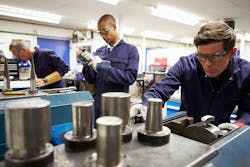6 Ways to Increase Engineering Productivity in 5 Minutes a Day
Staying productive during an eight-hour workday can be a challenge. Distractions and poor task planning are a few problems that can lower engineers’ efficiency. The following six tips will help you add hours to your workday.
1. Plan each day the night before — Whether you do this at home or at work, dedicating five minutes each evening to plan tasks that need to be accomplished the next day can immensely increase engineering productivity. Create a to-do list and prioritize the most important design tasks. While you sleep, your brain will process these projects so that they come easily to you the next day. This way, when you enter the office, you can start working right away with focus.
2. Create deadlines — Creating deadlines for engineering tasks, whether small or large, will increase productivity and ensure projects are completed on time. Try your best to stick to deadlines and ask for help when needed. Often people focus on what is urgent instead of what is important, so by putting deadlines on important tasks, they will not get pushed to the back burner.
3. Take breaks — Take a five-minute break whenever you feel mentally fatigued. Take a short stroll around the block, get up from your chair to stretch, or even grab a quick snack. Many engineers like to power through the day without any breaks, however this can actually decrease productivity. Especially with highly complex designs, taking a break allows you to refresh your mind, increasing productivity for the rest of the day.
4. Eliminate distractions — Be sure to turn off all notifications when you step into the office, whether it is on your computer, tablet, or cell phone. You may think that it will only take five seconds to check your Facebook notifications, your personal email, or text messages, however that’s usually not the case.
People typically end up spending more time getting back into their projects or work after being distracted by an innocent quick check of notifications. In addition, try your best to avoid interruptions throughout the day. If you know you have a big project due and your coworker wants to chat, do not be afraid to let them know you are busy and would love to talk later.
5. Quit multitasking — Many people think that multitasking is an important skill for increasing productivity and efficiency. However, it's not the case, especially in engineering. Studies show that attempting to complete several tasks at once proves to be slower. It’s easier to get distracted or confused by other projects while working on one when you multitask. Instead, you should focus on one task at a time before moving onto the next task. This will allow you to focus and ensure top-quality work.
6. Stay up-to-date — Take advantage of online tools and resources to increase your productivity at work. Online learning platforms allow you to stay up-to-date with the latest capabilities and best practices without having to leave the office. Spending five minutes learning a timesaving function in your software will pay dividends for future productivity. When you are stuck on a design challenge, use online resources to get answers quickly so that you can get back to your project.
Tony Glockler is the co-founder of SolidProfessor, an online learning company specializing in software applications used in engineering and design. His previous contribution to AmericanMachinist.com was Identifying the Skills, Training the Engineers for 2045. Glockler works to combine the best of instructional design and technology, to help engineers and designers become more effective.
